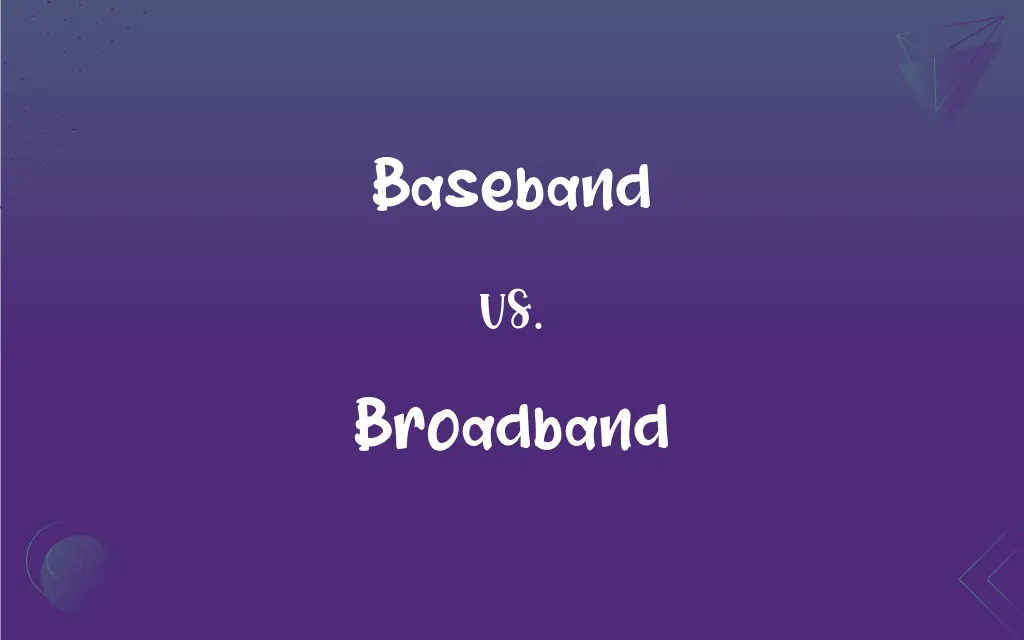Baseband vs. Broadband: What's the Difference?
Edited by Aimie Carlson || By Janet White || Published on December 22, 2023
Baseband transmits a single signal over a channel, while broadband can transmit multiple signals simultaneously over multiple channels.

Key Differences
Baseband transmission involves sending a single digital or analog signal over a single communication channel, often using pulse modulation. In contrast, broadband transmission allows multiple signals to travel simultaneously over multiple channels, typically using frequency division multiplexing.
Baseband typically uses direct electrical signals and is commonly employed in LAN technologies like Ethernet. Broadband, on the other hand, often involves modulating signals to higher frequencies, suitable for transmitting over various media like coaxial cables, fiber optics, or wireless systems.
Baseband is limited to a single communication channel, restricting its capacity, while broadband offers higher bandwidth, supporting greater data transmission rates. This makes broadband ideal for internet and cable television services.
In baseband, the entire bandwidth of the cable is consumed by a single signal. Conversely, broadband splits the cable's bandwidth into multiple channels, allowing for concurrent transmissions of voice, data, and video.
The simplicity of baseband makes it cost-effective for short-distance communication. However, broadband is more versatile and scalable, catering to long-distance and high-capacity requirements.
ADVERTISEMENT
Comparison Chart
Signal Type
Single digital or analog signal
Multiple signals over multiple channels
Bandwidth Utilization
Consumes entire bandwidth for one signal
Splits bandwidth into multiple channels
Common Uses
LAN technologies like Ethernet
Internet, cable TV, and wireless communication
Transmission Range
Suitable for short distances
Ideal for long distances
Complexity and Cost
Simple and cost-effective
More complex and scalable
ADVERTISEMENT
Baseband and Broadband Definitions
Baseband
Baseband is the transmission of a single signal over a communication channel.
Ethernet uses baseband transmission for local area networking.
Broadband
Broadband is suitable for long-distance and high-capacity communication.
Broadband networks support long-distance telecommunication services.
Baseband
Baseband involves direct signal transmission without modulation.
Baseband technology is utilized in digital TV to transmit raw video signals.
Broadband
Broadband uses frequency division multiplexing to carry multiple signals.
Cable TV utilizes broadband technology to deliver multiple channels.
Baseband
Baseband refers to a single frequency transmission occupying the whole bandwidth of the channel.
In baseband, the entire capacity of the cable is dedicated to one data signal.
Broadband
Broadband involves transmitting multiple signals simultaneously over different channels.
Broadband is used in internet services to provide high-speed data transmission.
Baseband
Baseband is ideal for short-distance, point-to-point communication.
Baseband transmission is common in computer networks within a single building.
Broadband
Broadband is characterized by a wide band of frequencies for signal transmission.
Broadband connections enable simultaneous voice and data transmission.
Baseband
Baseband can be either digital or analog in form.
Baseband digital transmission is a basic form of data communication in LANs.
Broadband
Broadband encompasses various technologies like DSL, fiber optics, and wireless.
Broadband wireless technology provides internet access in remote areas.
Baseband
(telecommunications) The frequency range occupied by a message signal prior to modulation.
Broadband
Of or relating to high-bandwidth data transmission.
Baseband
A method of transmission in which only one frequency channel is used at a time.
Broadband
Of or relating to data transmission that uses multiple channels so that multiple pieces of data can be transmitted simultaneously.
Baseband
(electronics) A device using baseband transmission.
Broadband
Any of several technologies that allow rapid transmission of data, as by using multiple channels simultaneously.
Broadband
(telecommunications) Of, pertaining to, or carrying a wide band of electromagnetic frequencies
Broadband
(telecommunications) A wide band of electromagnetic frequencies
Broadband
(Internet) An internet connection provisioned over an existing service using alternate signal frequencies such as ADSL or cable modem.
Broadband
Of or relating to or being a communications network in which the bandwidth can be divided and shared by multiple simultaneous signals (as for voice or data or video)
Broadband
Responding to or operating at a wide band of frequencies;
A broadband antenna
FAQs
How does broadband support high data rates?
Broadband utilizes multiple channels, allowing for higher data rates and more efficient transmission.
What is broadband transmission?
Broadband involves transmitting multiple signals over multiple channels, commonly used in internet and cable services.
Can baseband carry multiple signals?
No, baseband is limited to a single signal per channel.
Is baseband suitable for long-distance transmission?
Baseband is typically used for short distances due to signal strength limitations.
What are common applications of broadband?
Broadband is used in internet services, cable TV, and wireless communications.
Can broadband be used for wireless communication?
Yes, broadband technology is widely used in wireless communication systems.
What is baseband transmission?
Baseband is the transmission of a single signal over a single channel, often used in local networks.
What is the main limitation of baseband?
The main limitation of baseband is its single-channel, single-signal transmission capacity.
How does broadband handle different types of data?
Broadband can simultaneously transmit various types of data, like voice, video, and internet, over different channels.
Is baseband more cost-effective than broadband?
Baseband is generally more cost-effective for short-range applications due to its simplicity.
Does broadband require modulation?
Yes, broadband often involves modulating signals to higher frequencies for transmission.
Does broadband offer better scalability than baseband?
Yes, broadband's multiple channels offer better scalability and adaptability for various services.
Is baseband limited to wired communication?
Baseband is primarily used in wired communication, like Ethernet and digital TV.
Can broadband be used in both urban and rural areas?
Yes, broadband, especially wireless types, can provide services in both urban and rural areas.
Can baseband be both digital and analog?
Yes, baseband transmission can be either digital or analog.
What role does frequency play in broadband?
In broadband, different frequencies are used to transmit multiple signals concurrently.
Can baseband support high-speed internet?
Baseband is not typically used for high-speed internet due to its single-channel limitation.
Are baseband transmissions prone to interference?
Baseband can be less prone to interference due to its direct signal transmission method.
Is Ethernet a form of baseband?
Yes, Ethernet is a common example of baseband communication technology.
How does broadband benefit multimedia transmission?
Broadband's multiple channels allow for efficient simultaneous transmission of multimedia content.
About Author
Written by
Janet WhiteJanet White has been an esteemed writer and blogger for Difference Wiki. Holding a Master's degree in Science and Medical Journalism from the prestigious Boston University, she has consistently demonstrated her expertise and passion for her field. When she's not immersed in her work, Janet relishes her time exercising, delving into a good book, and cherishing moments with friends and family.
Edited by
Aimie CarlsonAimie Carlson, holding a master's degree in English literature, is a fervent English language enthusiast. She lends her writing talents to Difference Wiki, a prominent website that specializes in comparisons, offering readers insightful analyses that both captivate and inform.






































































